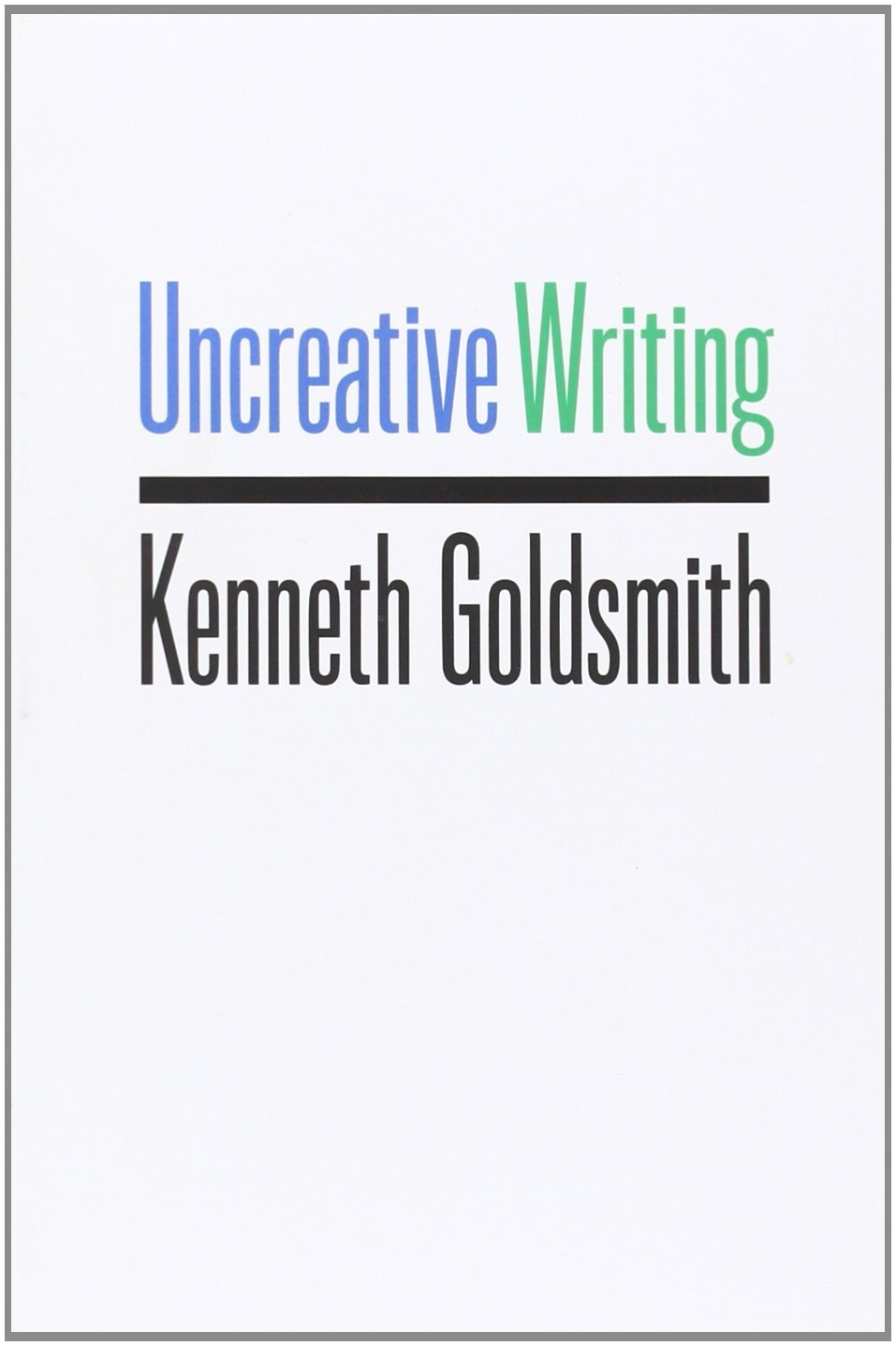Kenneth Goldsmith, Uncreative Writing
It’s funny to think about how outrageous I found Kenny’s ideas at first, and now how unbelievably obvious and level-headed I find them.
Re-reading this, my favorite chapters are “What Writing Can Learn From Visual Art” (like Brion Gysin said, writing is always 50 years behind painting — KG used to be a visual artist, and edited a book of Warhol interviews) and “Uncreative Writing In The Classroom.” More favorite bits:
Poetry is everywhere.
John Cage said that music is all around us if only we had ears to hear it. I would extend that to say that, particularly in New York City, poetry is all around us, if only we had the eyes to see it and the ears to hear it.
We’re mashups.
I don’t think there’s a stable or essential “me.” I am an amalgamation of many things: books I’ve read, movies I’ve seen, television shows I’ve watched, conversations I’ve had, songs I’ve sung, lovers I’ve loved. In fact, I’m a creation of so many people and so many ideas, to the point where I feel I’ve actually had few original thoughts and ideas; to think that what I consider to be “mine” was “original” would be blindingly egotistical.
An artist is mostly defined by his or her choices:
What becomes important is what you — the author — decides to choose. Success lies in knowing what to include and — more important — what to leave out. If all language can be transformed into poetry by mere reframing — an exciting possibility — then she who reframes words in the most charged and convincing way will be judged the best.
It’s impossible to not express yourself.
The secret: the suppression of self-expression is impossible. Even when we do something as seemingly “uncreative” as retyping a few pages, we express ourselves in a variety of ways. The act of choosing and reframing tells us as much about ourselves as our story about our mother’s cancer operation. It’s just that we’ve never been taught to value such choices. After a semester of forcibly suppressing a student’s ‘creativity’ by making them plagiarize and transcribe, she will approach me with a sad face at the end of the semester, telling me how disappointed she was because, in fact, what we had accomplished was not uncreative at all; by not being ‘creative,’ she produced the most creative body of work writing in her life. By taking an opposite approach to creativity — the most trite, overused, and ill-defined concept in a writer’s training — she had emerged renewed and rejuvenated, on fire and in love again with writing.
By worrying less about self-expression, we may surprise ourselves.
No matter what we do with language, it will be expressive. How could it be otherwise? In fact, I feel it is impossible, working with language, not to express oneself. If we back off and let the material do its work, we might even in the end be able to surprise and delight ourselves with the results.
Copying is one of the best ways to understand a piece of art.
Quoting Walter Benjamin in Reflections
The power of a country road is different when one is walking along it from when one is flying over it by airplane. In the same way, the power of a text is different when it is read from when it is copied out. The airplane passenger sees only how the road pushes through the landscape, how it unfolds according to the same laws as the terrain surrounding it. Only he who walks the road on foot learns of the power it commands, and of how, from the very scenery that for the flier is only unfurled plain, it calls forth distances, belvederes, clearings, prospects at each of its turns like a commander deploying soldiers at a front. Only the copied text thus commands the soul of him who is occupied with it, where as the mere reader never discovers the new aspects of his inner self that are opened by the text, that road cut through the interior jungle forever closing behind it: because the reader follows the movement of his mind in the free flight of daydreaming, whereas the copier submits it to command.
And Gertrude Stein:
“I always say that you cannot tell what a picture really is or what an object really is until you dust it every day and you cannot tell what a book is until you type it or proof-read it. It then does something to you that only reading it never can do.”
Celebrate not just the extraordinary, but the ordinary-ordinary.
In a 1963 interview, Warhol asks, “But why should I be original? Why can’t I be nonoriginal?” He sees no need to create anything new: “I just like to see things used and reused.” Echoing then-current notions of eradicating the division between art and life, he says, “I just happen to like ordinary things. When I paint them, I don’t try to make them extraordinary. I just try to paint them ordinary-ordinary.”
And maybe my favorite sentence in the book comes when KG is talking to his lawyer cousin who spends all day putting together boring legal briefs:
Why don’t you think of what you do all day as art?
Filed under: steal like an artist



 betzistar
betzistar